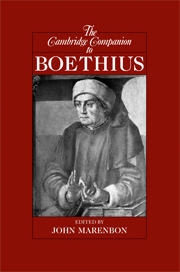Book contents
- Frontmatter
- Introduction: reading Boethius whole
- Part 1 Before the Consolation
- Part II The Consolation
- 8 The Good and morality: Consolatio 2-4
- 9 Fate, prescience and free will
- 10 Interpreting the Consolation
- 11 The Consolation: the Latin commentary tradition, 800-1700
- 12 The Consolation and medieval literature
- Appendix: Boethius’ works
- Bibliography
- Index: References to Boethius' works
- General Index
- Series list
12 - The Consolation and medieval literature
from Part II - The Consolation
Published online by Cambridge University Press: 28 July 2009
- Frontmatter
- Introduction: reading Boethius whole
- Part 1 Before the Consolation
- Part II The Consolation
- 8 The Good and morality: Consolatio 2-4
- 9 Fate, prescience and free will
- 10 Interpreting the Consolation
- 11 The Consolation: the Latin commentary tradition, 800-1700
- 12 The Consolation and medieval literature
- Appendix: Boethius’ works
- Bibliography
- Index: References to Boethius' works
- General Index
- Series list
Summary
THE EARLY MIDDLE AGES
Though the Consolation was evidently little read through most of the seventh and eighth centuries, clear evidence of a literary appreciation of Boethius begins as early as Alcuinobelus (* 804). The Consolation is the inspiration for the vision of philosophy as the culmination of study of the Liberal Arts boldly set forth in the dialogue De vera philosophia which prefaces his De grammatica. His moving poem “O mea cella” turns on a plangent echo of the opening meter of the Consolation, and the letters that promulgate his cultural program contain frequent quotations. Toward the middle of the ninth century Lupus of Ferrières produced a libellus identifying the different meters which imbue Boethius' dialogue with musicae suavitatis dulcedo, and Sedulius Scottus' De rectoribus christianis alternates prose with verse in a range of meters comparable to Boethius' own. The poetmonk Waldram of St. Gallen could find no better way to express his grief over the death of a fellow monk than by incorporating into his lament the first two couplets of the opening meter of the Consolation, and Boethius' “elegy” is echoed repeatedly in ninth-century poetry.
Further evidence for the literary fortunae of the Consolation in the early medieval period is provided by the surviving translations, and these are inseparable from the evolution of the commentary tradition discussed elsewhere in this volume.
- Type
- Chapter
- Information
- The Cambridge Companion to Boethius , pp. 279 - 302Publisher: Cambridge University PressPrint publication year: 2009
- 5
- Cited by



